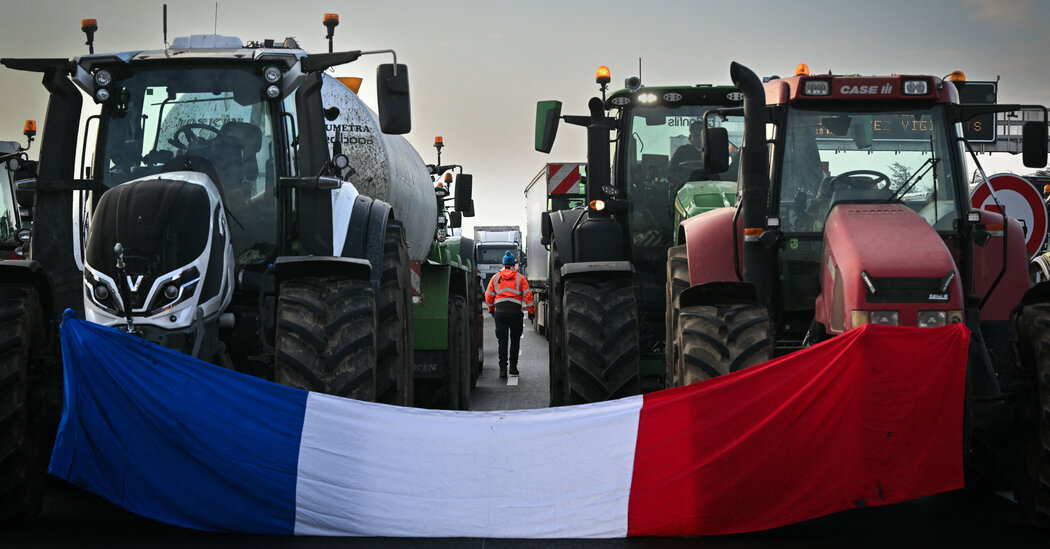A car plowed into a barrier set up by protesting French farmers early on Tuesday, killing one woman and injuring her husband and daughter, as France faced growing rural fury at perceived overregulation and increased diesel fuel prices.
The new government headed by Gabriel Attal, the 34-year-old prime minister, faced its first crisis with barricades spreading across highways throughout the southwest of the country. The protests mirrored similar demonstrations in Germany, driven by a sense of marginalization among farmers that the extreme right has been quick to exploit.
“This is the France of the forgotten,” Jordan Bardella, the president of the anti-immigrant National Rally party, said during a visit to the Bordeaux region on Saturday. “The fight for agriculture is also the fight against rural effacement, the cry of a French people who do not want to die.”
Rural discontent has also contributed to a surge in support for the far-right Alternative for Germany party, known as AfD, and the Dutch Party for Freedom, led by Geert Wilders. A political, economic and cultural abyss between the populations of major cities and what the French call “the periphery” has been a factor in the rise of anti-establishment, nationalist movements from the United States to Western Europe.
At one of the French barriers, in the southwestern Ariège region, a car carrying three foreigners hurtled through a wall of packed straw and into a family of cattle farmers from the village of Saint-Félix-de-Tournegat, according to local authorities. A woman died instantly. Her husband and teenage daughter are in critical condition, the Ariège prefecture said.
“The nation is in shock and expresses its solidarity,” Mr. Attal said in a statement.
The public prosecutor’s office in Foix, a city near the accident site, said that three Armenians in the car had been remanded in custody as part of a manslaughter investigation but that “the facts do not appear to support the theory of an intentional act.”
The incident, whatever its nature, raised tensions in the standoff between the government and farmers enraged by a proposal to eliminate a tax break on the diesel fuel used in tractors, which is generally delivered to farms in large tanks. A proposed increase in diesel prices for cars sparked the Yellow Vest protest movement in 2018 that led to violent clashes in Paris and brought wide areas of France to a standstill.
“We are going to stay here as long as the government does not announce some strong measures, and, if necessary, we will go and block Paris,” Cédric Baron, a farmer manning a barrier near Carbonne, south of Toulouse, told Le Monde, a daily newspaper.
Farmers are also angry over the proliferation of what they see as suffocating “norms” issuing from the European Union and the French government. These rules have become so all-encompassing that, in the words of Emmanuelle Ducros, writing in L’Opinion, a daily newspaper, “Being a farmer in France amounts to reading Kafka on a tractor.”
The regulations are so pervasive that almost none of the more than 66 million acres of agricultural land in France are unaffected. They address pesticides, fertilizers, protection of birds, preservation of wetlands, the obligation to leave 4 percent of land fallow, mandatory replanting of fields after harvests — all this and much more, governed under an increasingly complex system of zoning that means farms are cut into segments with differing rules.
Farmers see many of the regulations as reflecting the obsession with environmental issues of “elite” city dwellers and civil servants at the European Union headquarters in Brussels, coupled with ignorance of the practical hardships faced by rural workers more focused on making it to the end of the month than the goal of a carbon-free economy.
Faced with mounting fury, Marc Fesneau, the French agriculture minister, announced on Tuesday that a proposed new law governing the farming sector would be delayed for “a few weeks” to respond to the demand for “a simplification.” Mr. Attal, the prime minister, has been meeting with the main farmers’ unions in an attempt to defuse the crisis.
With European Parliament elections approaching in June, the National Rally has cast the European Union as “the enemy of the people,” as Mr. Bardella has described it, while portraying itself as the representative of “real people” — as opposed to urban elites.
The AfD has done much the same in Germany, which is facing widespread street protests provoked in part by a decision to phase out agricultural diesel fuel subsidies. On Jan. 15, thousands of farmers gathered around Brandenburg Gate in Berlin, with some demanding the government step down, even though a proposed tax on farm vehicles had been withdrawn.
Christian Lindner, the German finance minister, told the crowd that he would not make any more concessions. Although the head of the farmers’ association announced more protests if the federal government did not change its budget plans, the subsequent protests have been overshadowed by massive protests against the AfD.
President Macron appointed Mr. Attal this month as the head of a center-right government in part to head off the far-right National Rally; its longtime leader, Marine le Pen; and the charm offensive of her youthful lieutenant, Mr. Bardella. That the task will be arduous is already evident.
Christopher F. Schuetze in Berlin and Aurelien Breeden in Paris contributed reporting.
